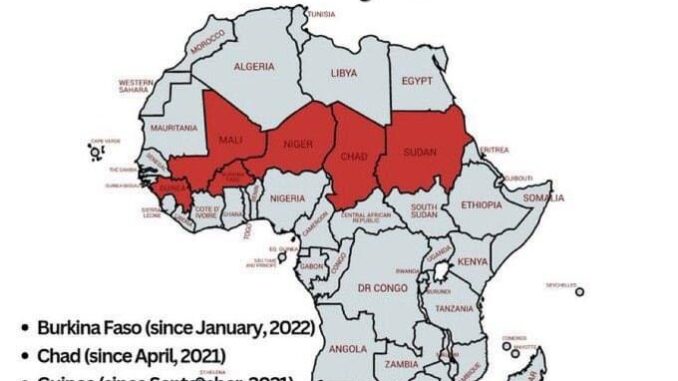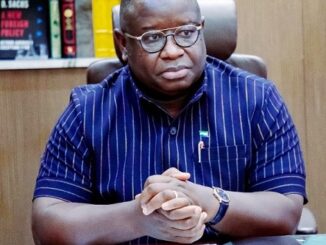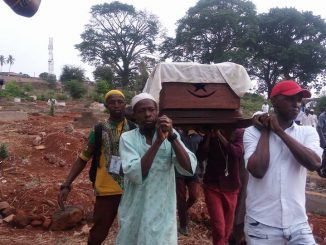
An allegation by the Sierra Leone Police that senior military officers have been arrested for allegedly planning to disturb the peace of the country is spreading apprehension in the subcontinent and indeed around the world over the the upsurge of military coups in West Africa. The news has appeared in the NEW YORK TIMES, the Russian media, PRAVDA , British newspapers and news outlets in Africa.
We bring you some interesting articles on the situation:
*𝘋𝘳 𝘠𝘶𝘴𝘶𝘧 𝘉𝘢𝘯𝘨𝘶𝘳𝘢 𝘰𝘯 𝘵𝘩𝘦 𝘥𝘦𝘷𝘦𝘭𝘰𝘱𝘪𝘯𝘨 𝘴𝘪𝘵𝘶𝘢𝘵𝘪𝘰𝘯 𝘪𝘯 𝘞𝘦𝘴𝘵 𝘈𝘧𝘳𝘪𝘤𝘢*
𝘛𝘶𝘦𝘴𝘥𝘢𝘺 𝘈𝘶𝘨𝘶𝘴𝘵 1, 2023
The political situation in West Africa is fragile and retrogressive. Most of the limited democratic gains of the 1990s in the region are being reversed.
Bola Ahmed Tinubu, the chair of ECOWAS, has a dubious mandate—he’s still facing a court challenge on his questionable election. Alassane Ouattara of Côte d’Ivoire is on an illegitimate third term. Macky Sall of Senegal wanted a third term but was forced by the public to give up on the idea only recently, while his chief opponent Ousmane Sonko is being hounded by the security forces and the courts. Sierra Leone has just held fraudulent elections that have been condemned by a number of international and national observers, but not by ECOWAS. Guinea, Mali, Burkina Faso and now Niger are ruled by military strong men. Guinea Bissau is a narco state. Liberia is ruled by an incompetent ex-footballer. Seemingly democratic Ghana is mired in economic crisis. Only tiny Cape Verde is an oasis of stable democratic politics in the region.
Nigeria shares a long border with Niger, which has supported Nigeria’s war against Boko Haram terrorists—intervention will worsen the Boko Haram war in Nigeria.
This is what we get when a regional body turns a blind eye on negative developments in the region and allows them to fester.
Coup Scare in Sierra Leone Puts Liberia on the Edge Ahead of October Elections amid Rampancy of Military Overthrow in the Region

MONROVIA – The surge of forceful extra-legal power seizures has raised concerns about political instability in West Africa, with Niger being the latest country affected in the sub-Saharan region. Sierra Leone, one of Liberia’s closest neighbors, stands at the brink of uncertainty, serving as a cautionary tale to Africa’s oldest nation, Liberia, which is still grappling with the repercussions of military overthrow.
Report by Lennart Dodoo, ldodoo@frontpageafricaonline.com
FrontPageAfrica has seen a diplomatic report filed by the Liberian Embassy in Sierra Leone informing the Liberian government of the alleged coup plot in that country involving several military officers.
This diplomatic report also stems from a press release issued by the Sierra Leonean Police disclosing that some senior military officers have been working to undermine the peace and tranquility of the state and have planned to unleash violence on the country.
According to the press release, preliminary investigation has shown that these military officers planned to use purported peaceful protests between August 7 to 10, as a guise to unleash violent attacks against state institutions and peaceful citizens.
These disturbing reports follow the controversial elections in Sierra Leone where the incumbent, President Julius Madaa Bio won the presidential election in the first round. This victory was greeted with local and international condemnations.
As it stands, four of the 15 member states of ECOWAS are now under military rule following a successful coup
The development in Sierra Leone comes on the heels of Niger’s military takeover and its alignment with Russia, while distancing itself from France, its former colonial master and long-time ally. Liberia, considered a darling child of the United States, now finds itself surrounded by unstable neighbors, as Guinea is under military rule, and Sierra Leone faces internal upheaval. As Liberia prepares for its own crucial October 10 elections, the stakes are high.
Liberia’s President, George Weah was one of the first ECOWAS head of state to express his utmost displeasure with Niger’s military overthrow.
He lamented that the incident, which unfolded on Wednesday, July 26, coinciding with Liberia’s 176th Independence anniversary, has raised concerns over democratic governance, rule of law, and peace across Africa.
“The Government of Liberia firmly condemns this brazen and unconstitutional action by the armed forces of Niger, as it undermines the democratic will of the peaceful people of Niger, who rightfully chose their leaders through a democratic process,” the Liberian government stated.
Currently in the region, Guinea, Mali, Burkina Faso, and Niger are all under military rule.
Meanwhile, a Ukrainian official has accused Moscow of being behind the coup in Niger, describing it as a typical tactic employed by Russia. Mykhailo Podolyak, an adviser to the Ukrainian president, asserted on a social media platform (previously known as Twitter) that Russia orchestrated the “military coup” in Niger to divert attention, take advantage of the situation, and escalate the conflict.
According to Podolyak, Russia follows a global strategy of fostering instability to undermine the global security order. He emphasized the need to remove the clan associated with Russian President Putin and steer Russia towards a political rebirth in order to ensure global rules and stability.
The Kremlin responded on Monday, expressing “serious concern” over the situation in Niger following the coup. While the majority of the world condemned the coup, Yevgeny Prigozhin, the head of Wagner mercenary group with extensive interests in Africa, welcomed it. Kremlin spokesperson Dmitry Peskov called for all parties in Niger to exercise restraint and swiftly restore legal order.
Following Sierra Leone’s recent controversial elections, the region has been thrown into turmoil with the arrest of military officers suspected of plotting a coup in Sierra Leone. This development comes on the heels of Niger’s military takeover and its alignment with Russia, while distancing itself from France, its former colonial master and long-time ally. Liberia, considered a darling child of the United States, now finds itself surrounded by unstable neighbors, as Guinea is under military rule, and Sierra Leone faces internal upheaval. As Liberia prepares for its own crucial October 10 elections, the stakes are high.
Notably, Russia’s Wagner Group has not officially claimed responsibility for the coup, but Prigozhin praised the military takeover. Wagner’s involvement in various African countries, much to the dismay of Western nations, has been significant, and recently, the group was reported to have arrived in the Central African Republic (CAR) ahead of a constitutional referendum.
Since 2014, Russian involvement in Africa has experienced significant growth. Some African leaders have shown receptivity to overtures from Russia due to mounting concerns about the rising dominance of China in the region and the retrenchment of the United States (US). Additionally, they’ve shown interest in diversifying their trading and security partners, which has drawn them towards engaging with Russia.
Russia has effectively cultivated these relationships by drawing upon the legacy of the Soviet Union’s historic support for anti-colonial and liberation movements in Africa. Through this shared history, Russia has established a sense of solidarity and understanding with African nations.
Moreover, Russia focuses on strengthening diplomatic, military, and economic collaborations with African countries. This approach has allowed them to forge mutually beneficial partnerships that address the development, security, and trade interests of both parties involved.
With the development in Niger and what is unfolding in Sierra Leone, some political pundits believe with Liberia being a possible Africa Command Base for the United States, Russia could be taking a giant leap in strategically positioning itself in the region to gain desired advantage ahead of the October elections in Liberia.
Liberian Government in its statement following the Niger’s saga expressed its unwavering commitment to opposing any form of unconstitutional means to ascend to power. The statement reiterated Liberia’s zero-tolerance stance towards any actions that undermine democratic values and principles.
But in the midst of this, a leading opposition leader, Alexander B. Cummings of the Collaborating Political Parties (CPP) has expressed lack of confidence in the constitution of the country’s Election Commission.
Cummings says Liberia and its citizens will be at risk if President George Weah and his government preside over the fraudulent conduct of the ensuing elections in the country.
Mr. Cummings reminded President Weah and his government that the prolonged civil conflict in Liberia was triggered as a result of dissatisfaction over the results of elections, and as such, the Liberian Chief Executive should be cognizant of the risk that would be posed to the nation and its people if the ensuing elections are not free, fair and transparent.
He emphasized that presently, the CPP has issues with the current Board of Commissioners appointed by President Weah to head the National Elections Commission (NEC).
He declared lack of confidence in the ongoing electoral processes being carried out by the current Board of Commissioners of the NEC.
Mr. Cummings said the failure of President Weah to adhere to a mandate from the Economic Community of West African States (ECOWAS) for opposition politicians to nominate few of the Commissioners now presents the NEC as a “partisan commission.”
DIASPORA NEWS
Planned Coup Plot Puts Sierra Leone On Edge-As Top Military Officers Arrested
- INDEPENDENT PROBE NEWSPAPER, LIBERIA

— Is Maj.-Gen. Charles Johnson III proposal for Reduction of powers for Presidential Guards An Option?
IPNEWS: Exactly a week since presidential guards sized power in Niger reports from neighboring Sierra Leone say some Police officers have arrested several people, including high-ranking soldiers within the Sierra Leone military, suspected to be planning violent attacks on citizens.
In a police statement late Tuesday, August 1, the country’s joint security forces stated that they have been following ‘intelligence regarding the activities of certain individuals, including senior military officers, working to undermine the peace and tranquility of the state’.
“In that regard, several arrests have been made and the suspects are assisting the police with the investigations.” The Joint Security statement read.

The statement further said that the suspects planned were using peaceful protests scheduled for next week “as a guide to unleashing violent attacks against state institutions and peaceful citizens.”
On August 10, 2022, economic and political protests in the capital Freetown and other cities spiraled into deadly clashes. Twenty-seven civilians and six police officers died that day and in the several days that followed, according to official figures.
Amnesty International said it had gathered testimonies alleging excessive use of force, and condemned internet restrictions.
The West African nation held general elections on June 24. President Julius Maada Bio was re-elected for a second term, according to official results, which the opposition disputes.
International observers noted “statistical inconsistencies” and condemned a “lack of transparency” in the
ballot count after the election
The opposition has refused to participate in local or national government, with all but one MP boycotting parliament. The suspects were taken into custody to prevent President Julius Maada Bio’s democratically elected government from being toppled, as it happened last week in the Republic of Niger when President Mohamed Bazoum was removed by the junta.
Bazoum was ousted in a military coup and General Abdourahmane Tchiani, also known as Omar Tchiani, took over the affairs of the country. The Economic Community of West African States (ECOWAS) led by Nigerian President Bola Tinubu has given the coup leaders to reinstate Bazoum in one week.

While foreign nations like the United States and France have thrown their weight behind the ECOWAS, Mali and Burkina Faso pledged their support to the military regime in Niger. (courtesy of the Guardian Newspaper)
Last week, the Chief of Staff to the Liberian Armed Forces, Maj.-Gen. Charles Johnson III proposed that the powers of Presidential Guards must be limited in ‘order to prevent more incidences of Coup d’etat in the ECOWAS region’.
General Johnson made this known while speaking with journalists on Thursday on the sidelines of the joint delocalized meeting of the ECOWAS Parliament’s Joint Committees on Political Affairs, Peace, Security, and the African Peer Review Mechanism, Judicial Affairs and Human Rights, Social Affairs, Gender, and Women Empowerment in Monrovia.
He said that member states must be mindful of how much control the military has, following the Coup d’etat that ousted President Mohamed Bazoum of Niger from power on Wednesday.
Johnson had earlier delivered a paper on the topic “The Role of the Armed and Security Forces in Political Government: The Cases of Mail, Burkina Faso, and Guinea, Lessons to be Learned and Prospects.
“My second recommendation was the issue of Presidential guard or elite forces that has direct control over the commander in Chief.
“So, if you look at what is happening even in Niger yesterday, it is the Presidential guards. And look at our history in Liberia, we have seen the issue of Presidential guards being misused.
“The Peace and Reconciliation Report of 2008 says that the Special Anti-Terrorism Unit was involved in a lot of alleged atrocities according to the report.
“That is why I emphasized that we need to be mindful and allow the military to have this control.
“When you have this political interference into the command and control of the military, like having a Presidential guard, the Commander in Chief selecting somebody to head it instead of allowing the CDS, Chief of Defense Staff DS to go through that process or having somebody to control, then it becomes a problem.
“Because the CDS or the Chief of Staff has no control over the unit because he takes direct control from the Commander in Chief”, he said.
Johnson III said that there is no justification for any military coup no matter the situation.
“No justification for all the military coups that have been happening, absolutely not,” Johnson added.
The Liberian Major General also advocated for dialogue with the embattled countries, noting that sanctions were not the best way to resolve such crises.
He said that terrorism will not be adequately fought if the countries are kept aside, adding that suspending them poses more threats, especially with border countries.

“So, my last recommendation is that we need to dialogue. We cannot fight terrorism if we suspend these countries.
“I have a border with Guinea, we need to protect that borderland between Liberia and Guinea. If our heads of state go ahead to sanction them, can you still allow me to work with Guinea?
“Because if I am not working with Guinea it is going to be difficult. That is why I recommended that we still need to dialogue”.
Johnson III said that the military must stick to its mandates of protecting the nation and not interfere in governance.



